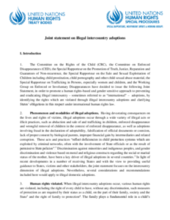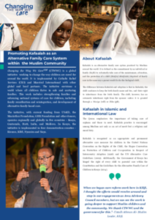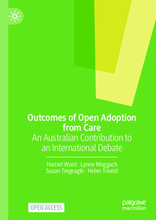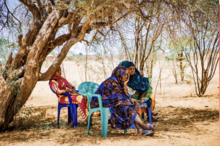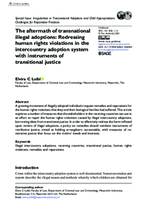Displaying 61 - 70 of 660
This joint statement was issued while the question of illegal intercountry adoptions is being raised in several countries, with an increasing number of adoptees discovering inconsistencies or errors in their adoption process, and that stories they had been told about their origins and the reasons for their adoptions were fake.
This short document describes the process of ensuring Kafaalah is considered as a family-based alternative care option within Kenya and the work to promote best practice within the model. It describes the journey of developing a framework and standard operating procedures, beginning with the launch of the Kenyan Guidelines on the Alternative Family Care of Children in 2014. Changing the Way We Care worked with many partners and shares the learning on Kafaalah through this document. Changing the Way We Care is a global initiative implemented by Catholic Relief Services, Maestral International, and other global, national and local partners working together to change the way we care for children around the world.
This article discussed the proceedings for placement of children in foster care by foreign authorities introduced into Polish law. The available official data indicate that the British and German authorities are the most inclined to place children with Polish citizenship in foster care in their homeland.
South Korea experienced international scrutiny over its irregular intercountry adoption practices in the 1980s. However, it eventually came to be viewed as a model of transparent and efficient adoptions. This façade disguises an orphan adoption system that has become entrenched over the decades. Today, adoptees continue to lobby for their right to origins. This paper explores South Korea’s laws and policies, which nullified the rights of adoptees, and it calls for receiving countries to assume co-responsibility to restore these rights.
This book presents new and vivid findings concerning the extensive vulnerability of this population of children at the point of entry to care. It also shows that there is much to learn at an international level from the experiences of those involved in mandatory face-to-face post adoption contact - a uniquely Australian policy. The book provides evidence which shows how continuing post-adoption contact was experienced by adoptees and their adoptive parents. This book is open access, which means that you have free and unlimited access.
In this video Simon Kanyembo, Director of Social Services at ACE Zambia, addresses the following questions: why child welfare organizations should prefer family-based care to institutional care and response to children who are abandoned or unable to be reintegrated.
This framework was developed to guide the process of taking in vulnerable children by families, whether they are related to the specific families or not and bringing them up the same way they bring up their biological children.
A growing movement of illegally adopted individuals request remedies and reparations for the human rights violations that they and their biological families had suffered. This article explores a number of measures that the stakeholders in the receiving countries can use in an effort to repair the human rights violations caused by illegal intercountry adoptions, borrowing ideas from transitional justice. In order to effectively redress the harm inflicted upon victims of illegal adoptions, a policy on remedies should combine instruments of retributive justice, aimed at holding wrongdoers accountable, with measures of restorative justice that focus on the victims’ needs and interests.
This webinar, the fourth in a series from the Transforming Children's Care Global Collaborative Platform, explored the importance of protecting the child’s right to identity in how it is created, how it may be modified and/or falsified in alternative care as well as the need to preserve information about the child’s identity, notably family relations.
This study sought to understand how intercountry adoptees with adoption discontinuity histories experience legal, relational, and residential permanency losses through the framework of ambiguous loss and trauma.

